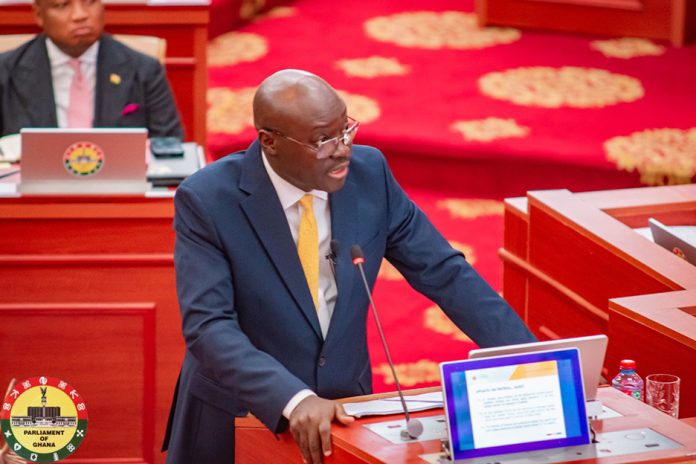Minister of Finance, Dr. Cassiel Ato Forson, has declared that the current administration did not assume office to “manage decline” but to “reverse it and reset the nation.”
Presenting the 2025 Mid-Year Budget Review in Parliament on Thursday, the Minister pointed to key macro-economic gains achieved in the first half of the year, as evidence of the country’s gradual, but determined economic recovery.
With visible confidence, Dr. Ato Forson anchored his presentation on four pillars: macroeconomic performance, fiscal discipline, debt restructuring and the rehabilitation of key government programmes.
The data, he noted, reflect a government focused on stability, sustainability and structural reform, rather than short-term populism.
Growth Beyond Expectations
According to the Minister, Ghana’s economy expanded by 5.3% in the first half of 2025, surpassing the year’s target of 4%.
This growth marks the highest first-quarter performance since 2020, buoyed by agriculture (6.6%), services (5.9%) and industry (3.4%).
Notably, the fishing sub-sector surged by 16.4% and ICT-led growth in the services sector reached 13.1%.
“From promises to purpose, from ineptitude to action, and from distress to relief we are building a resilient economy,” Dr. Ato Forson said.
He credited the government’s flagship 24-hour economy initiative, the Big Push Programme, and the Agriculture for Economic Transformation (AfET) agenda as strategic levers driving the rebound.
Inflation Falls Sharply, Cedi Appreciates
Inflation, a major source of public concern in 2024, has dropped significantly. Consumer inflation declined from 23.8% in December 2024 to 13.7% in June 2025. Producer price inflation tumbled from 26.1% to 5.9%, and food inflation dropped by over 11 percentage points within the same period.
“This is not luck; it is the result of deliberate fiscal consolidation, tight monetary policy, and currency stability,” the Finance Minister emphasised.
The Ghana cedi has seen a historic rebound appreciating by 42.6% against the US dollar, from GH¢17 to GH¢10.4. It also appreciated by 30.3% against the British pound and 25.6% against the euro.
The Minister of Finance said the reversal of multi-year depreciation is “unprecedented in Ghana’s history.”
Interest Rates, Borrowi and Debt Payments Down
He explained that interest rates on treasury bills fell sharply, with the 91-day bill dropping from 27.7% to 14.7%. Lending rates eased slightly, and domestic borrowing declined significantly saving the country GHS 4.9 billion in interest payments.
According to the ministry, the government recorded a primary surplus of 1.1% of GDP (on commitment basis) as of June 2025, outperforming the 0.4% target. The fiscal deficit also improved, coming in at 0.7% compared to a target of 1.8%.
On cash basis, the deficit stood at 1.1%, again better than the expected 2.4%.
“These numbers tell a story of discipline. We are not overspending, we are delivering within our means,” the Minister said.
Reserves, External Sector
The Minister revealed that Ghana’s international reserves rose to $11.12 billion, equivalent to 4.8 months of import cover up from $8.98 billion in December 2024. The trade surplus increased to $5.57 billion, a more than 300% rise from the previous year.
Meanwhile, capital and financial inflows reached $937 million by June 2025, reflecting investor confidence.
He also highlighted the government’s commitment to further stabilizing the cedi through measures such as the establishment of the Ghana Gold Board and sustained export development, alongside reforms at the Bank of Ghana. While acknowledging that challenges remain, Dr. Ato Forson said the first half of 2025 marks a turning point.
“Our steps are now steadier. The direction is clearer. Ghana is back. We inherited uncontrolled spending, but today, we are delivering measured discipline and real results,” he said.










